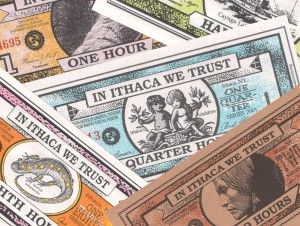For decades alternative currencies have been a staple in many localized economies, even in such places as Detroit, MI where a local scrip known as the Detroit Cheers was prevalent during both the Great Depression, and again after the 2008 Credit Crisis. And as the world rushes headlong towards the next great monetary crisis, the use of alternative currencies are once again coming to the forefront as central banks put the screws on nations in debt beyond their means to pay.
When Christos Papaioannou noticed his car needed new tires, the Greek computer engineer bought them with euros—but used an alternative currency, called TEM, to pay his mechanic for the labor.
His country has avoided a catastrophic exit from the common currency, at least for now. But a small but growing number of cash-strapped Greeks, who are still grappling with strict money-withdrawal limits, have found another route in TEM and other unconventional payment systems like it.
Before then, Ms. Sotiropoulou said she was only aware of two such programs. No official record of the number of alternative currencies and local bartering systems appears to exist in Greece. But according to an Athens-based grass roots organization called Omikron Project, there are now more than 80 such programs, double the number in 2013. They vary in size, from dozens of members to thousands. – Wall Street Journal Alternative Currencies Flourish in Greece as Euros Are Harder to Come by
Discouragement in banks, central banks, and in government policies such as ‘too big to fail’ have changed the confidence and landscape of money over the past seven years. In the East, the rush to stockpile gold has left many wondering if China, Russia, or the entire BRICS coalition are planning on re-introducing the gold standard. While in the West the rise of crypto-currencies such as Bitcoin are a reaction to the debt based money scheme that has moved wealth into the hands of a select few, and has placed the responsibility of that debt onto the people, and not the institutions that actually owe it.
Whatever the medium, it is very likely that alternative currencies, both short term and long term, will arise en masse after the world discovers it is impossible to cover the nearly one quadrillion in debt floating out in the global financial system. And while governments will attempt to put the onus of paying off that debt onto the people, just as EU is doing right now in the nation of Greece, the people will go back to functioning as they did long before the rise of central banking, and run commerce at a more localized level using both barter and accepted forms of alternative currency.
Kenneth Schortgen Jr is a writer for Secretsofthefed.com, Examiner.com, Roguemoney.net, and To the Death Media, and hosts the popular web blog, The Daily Economist. Ken can also be heard Wednesday afternoons giving an weekly economic report on the Angel Clark radio show.
